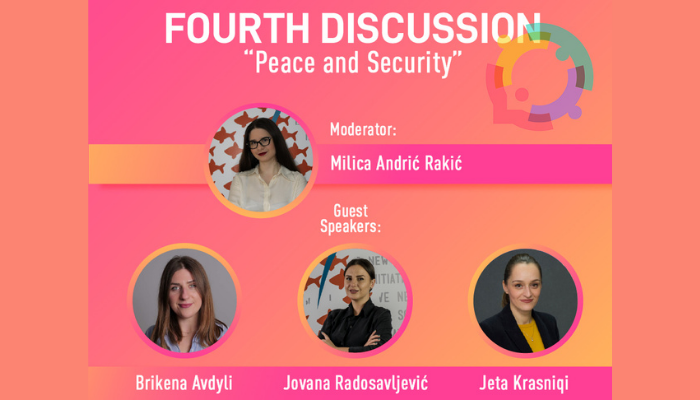Category: Blog Organizations: Jahjaga Foundation , New Social Initiative , Kosova Democratic Institute Tags:
Women are contributing to the peacebuilding process, concluded the discussion "Peace and Security", one of five organized discussions as part of the Digital Trust Building Week organized during April. The Executive Director of the Jahjaga Foundation, Brikena Avdyli, the Executive Director of the New Social Initiative, Jovana Radosavljević, and the Project Manager at the Kosovo Democratic Institute, Jeta Krasniqi, spoke on this topic.
Why should women be part of the peacebuilding process?
"In Kosovo, women carry the greatest weight and burden in everyday life, in order to be part of the peace-building process. It starts with their narrative, that is, the way they tell their children, how they encourage them to act and act together in order to create mutual trust,” Avdyli points out.
She also believes that it is necessary to build peace at the so-called local level, among ordinary people and "among ourselves", in order to be more permanent.
"There are differences on the ethnic level, but we have mixed so many things over the years on the human level. These are the things that make us human and, in that way, we can overcome many things that are more political than what follows us on a daily basis,” she adds.
Krasniqi also points out that some of the difficult topics in the post-war events were raised by women.
"Regardless of ethnicity, women have raised their voices and are fighting not only for women's rights, but also for human rights, for equality," said former adviser to former Kosovo President Atifete Jahjaga.
We should look at the inclusion of women as something "homogeneous, not secondary", she believes.
"Women should be seen as partners who have the right to talk about the future of their country, not only on specific issues, but also on issues that were considered masculine until yesterday," she said.
Radosavljevic shares a similar view:
"The contribution of women is key to the success of any peacebuilding process, because if we exclude half the population from these processes, it is impossible to expect any sustainable peace to occur. Women are important because they bring completely different perspectives and priorities than men.”
She also believes that the "most visible" women are those in politics, adding that current Kosovo President Vjosa Osmani faces a "big task", as Radosavljevic believes she should be a symbol of unity and a unifying factor for all citizens.
What problems lead to marginalization and, possibly, radicalization?
Lack of economic labeling, challenges in education, expectations in the post-war period, health care are some of the crucial problems faced, mostly by women and young people - points out the executive director of the Jahjaga Foundation.
She once again emphasizes the importance of women present at, as she points out, basic levels such as family, community, school in educating future generations.
"Their role is important and does not have to depend on the political level," she said.
Speaking about the problems present in minority communities, Radosavljevic points out that they are mostly the same as in majority communities.
"Women's problems do not look at ethnic differences. Problems are seen everywhere, all women go through certain types of marginalization and threats that arise with the new circumstances, ”she says.
"A woman carries a great burden, because many things are expected of her - to be educated and to work and to get married, to give birth to children and raise them, to do all that together and at the same time. The question is not how physically feasible it is, and how much help there is from the partner,” he adds.
Women victims of sexual violence during the war is a very important topic.
The participants in the discussion agree that the issue of women victims of sexual violence during the war is one of the most important to talk about.
Radosavljevic points out that women victims of sexual violence during the conflict from the Serbian and other non-majority communities are still, she says, not in the focus of the work of organizations that cover issues of the Serbian community, and that this is one of the topics that should be discussed.
"But it is important to say that it was not even possible for women from the Albanian community until a political climate and will was created that made this an extremely important topic to talk about," she said.
Avdyli also states that women who suffered sexual violence during the war are still considered victims, and that they do not want to go public with their testimonies.
"We still do not have punishments for the people who committed those crimes, and we are lagging behind. "Crime remains a crime for all of us," she said, adding that it was necessary to solve them in order to "turn a new chapter in the future".
Krasniqi, who is also a member of the Commission for the Verification of Victims of Sexual Violence, points out that such a war crime is "silenced by Kosovo or on the international scene."
"The stigma and denial of war crimes make the trauma of these women even more difficult," she said.
"It is very important that all persons who are victims of sexual violence, regardless of their affiliation and regardless of who committed these crimes, come to us, trust this commission and report them," she concluded.




